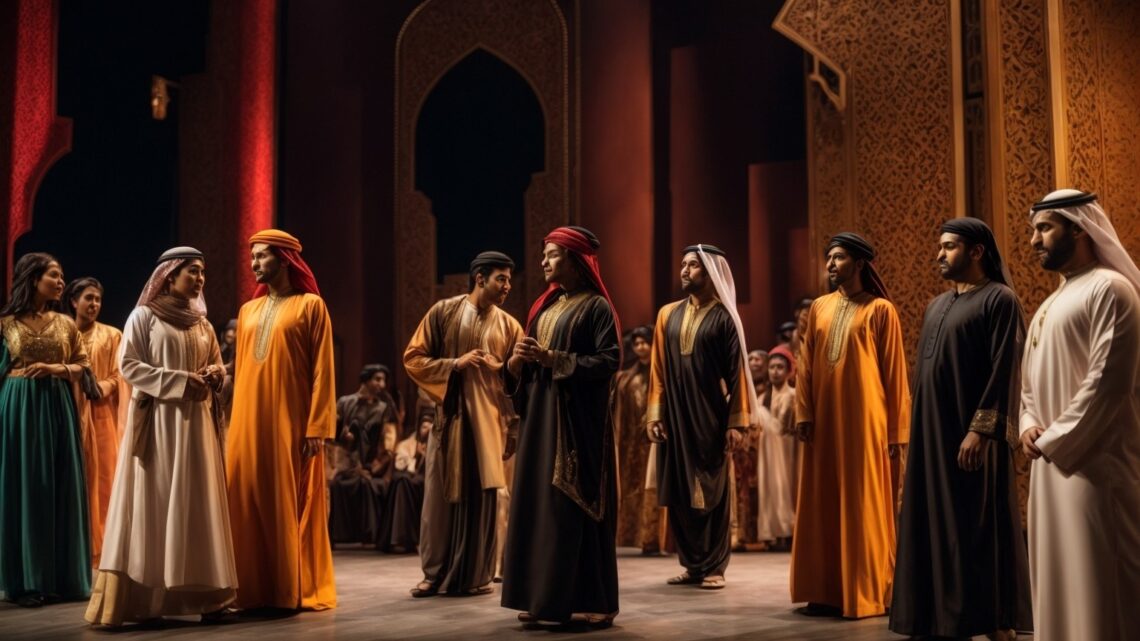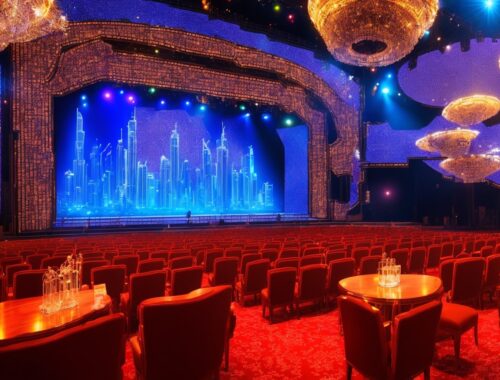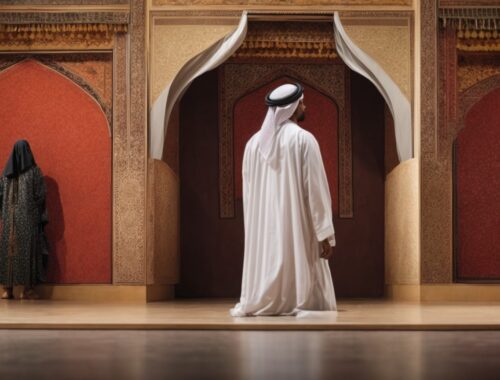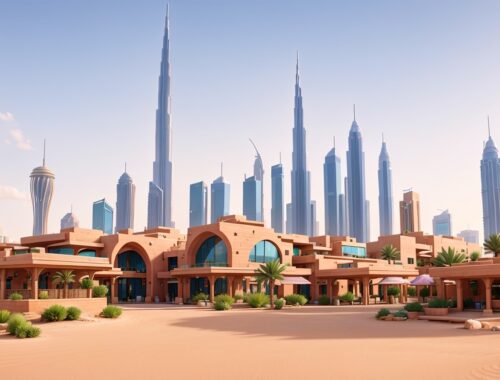
The Impact of Cultural Diversity on Dubai’s Theatre Productions
Dubai, a city known for its towering skyscrapers and luxurious lifestyle, has quietly been nurturing a vibrant and diverse theatre scene that reflects its multicultural population. With over 200 nationalities calling Dubai home, the emirate’s theatrical landscape has become a fascinating melting pot of traditions, styles, and narratives. This article delves into the unique ways cultural diversity has shaped Dubai’s theatre productions, offering a fresh perspective on the city’s artistic evolution.
A Theatrical Oasis in the Desert
Dubai’s theatre scene, much like the city itself, has experienced rapid growth over the past two decades. In 2000, there were only three dedicated theatre spaces in the emirate. Today, that number has skyrocketed to over 20, including state-of-the-art venues like the Dubai Opera, which opened in 2016 and can seat 2,000 spectators. This exponential growth reflects not only Dubai’s economic prosperity but also its commitment to becoming a global cultural hub.
The city’s theatrical offerings are as diverse as its population. In 2023 alone, Dubai hosted productions in 17 different languages, ranging from Arabic and English to Hindi, Tagalog, and Mandarin. This linguistic diversity is unparalleled in the region and rivals that of multicultural metropolises like London or New York.
Fusion Theatre: Where East Meets West
One of the most intriguing developments in Dubai’s theatre scene is the emergence of “fusion theatre” – productions that blend elements from different cultural traditions. These performances often combine Western theatrical techniques with Eastern storytelling traditions, creating a unique hybrid that resonates with Dubai’s cosmopolitan audience.
A prime example of this fusion approach is the annual “Sikka Art and Design Festival” in Al Fahidi Historical Neighbourhood. In 2023, the festival featured a groundbreaking production called “The Pearl Diver’s Daughter,” which combined elements of Emirati folklore with Bollywood-style musical numbers and avant-garde European staging techniques. The show, performed in a mix of Arabic, English, and Hindi, attracted over 5,000 attendees during its two-week run.
Multilingual Productions: Breaking Language Barriers
Dubai’s theatre companies have embraced the city’s linguistic diversity, often staging productions in multiple languages or using innovative translation techniques. The “Dubai Drama Group,” one of the oldest theatre companies in the emirate, has pioneered the use of real-time subtitling in their performances. Using cutting-edge projection technology, they offer subtitles in up to five languages simultaneously, allowing audiences from different linguistic backgrounds to enjoy the same performance together.
In 2022, a production of Shakespeare’s “A Midsummer Night’s Dream” at the Courtyard Playhouse took this concept even further. The show featured a cast of actors from 12 different nationalities, each performing in their native language. The result was a mesmerizing linguistic tapestry that captured the essence of Dubai’s multicultural spirit.
Exploring Identity Through Theatre
Many of Dubai’s theatre productions grapple with themes of identity, belonging, and cultural exchange – issues that resonate deeply with the city’s diverse population. The “Short+Sweet Theatre Festival,” an annual event that showcases 10-minute plays, has become a platform for exploring these themes. In the 2023 edition, 67% of the submitted plays dealt with topics related to cultural identity or cross-cultural experiences.
One standout production from the festival was “Passport to Nowhere,” a poignant piece about a third-culture kid struggling to define her identity. The play, written by an Emirati-Indian playwright and performed by a multinational cast, struck a chord with audiences and went on to be developed into a full-length production at the Junction Theatre.
Traditional Forms in a Modern Context
While Dubai embraces theatrical innovation, there’s also a strong movement to preserve and reimagine traditional forms of performance from various cultures. The “Heritage and Diving Village” in Al Shindagha hosts regular performances of Al-Ayala, a traditional Emirati dance, alongside Indian Kathakali performances and Persian Naqqali storytelling sessions.
In an interesting twist, some theatre companies are finding ways to blend these traditional forms with contemporary themes. The “Orb Theatre Company” made waves in 2023 with their production of “Oil and Water,” which used the structure of a traditional Arabic shadow puppet play to explore issues of environmental sustainability in the Gulf region.
Nurturing Diverse Talent
Dubai’s commitment to cultural diversity in theatre extends to education and talent development. The Emirates Performing Arts Centre, established in 2018, offers training programs in various theatrical traditions, from method acting to Peking opera techniques. In 2023, the centre hosted 87 workshops led by instructors from 23 different countries.
The impact of this diverse training is evident in the quality and variety of performances on Dubai’s stages. A recent production of “Death of a Salesman” at the Madinat Theatre featured a lead actor trained in Japanese Noh theatre, bringing a unique physicality to the role of Willy Loman that critics hailed as “revelatory.”
Cultural Exchange Through Theatre
Dubai’s theatre scene has become a powerful tool for cultural diplomacy and exchange. The city regularly hosts international theatre festivals and touring productions, exposing local audiences to a wide range of theatrical traditions. In 2023, the Dubai International Theatre Festival welcomed 42 productions from 31 countries, attracting over 50,000 attendees.
These events also provide a platform for local talent to gain international exposure. The “Dubai-Edinburg
h Theatre Exchange Program,” launched in 2020, has already sent 15 Dubai-based productions to the prestigious Edinburgh Fringe Festival, showcasing the emirate’s unique theatrical voice on a global stage.
Innovative Spaces for Diverse Voices
Dubai’s theatre infrastructure is evolving to accommodate its diverse theatrical offerings. The recently opened “Theatre of Nations” in Dubai Design District features five flexible performance spaces that can be configured to suit different theatrical traditions, from in-the-round setups for experimental works to proscenium stages for more traditional productions.
Another innovative space is the “Floating Theatre” on Dubai Creek, a converted dhow that hosts intimate performances for up to 50 audience members. In 2023, the Floating Theatre presented a series of monologues performed by expatriate workers, offering a platform for voices often underrepresented in Dubai’s cultural scene.
Corporate Support for Cultural Diversity
Dubai’s business community has played a crucial role in supporting the city’s diverse theatre scene. Many multinational corporations based in Dubai sponsor theatrical productions as part of their corporate social responsibility initiatives. In 2023, these sponsorships totaled over 15 million AED (approximately 4.1 million USD), with 60% of the funds specifically earmarked for productions that promote cultural diversity and intercultural understanding.
One notable example is the “Stages of Diversity” program, sponsored by a consortium of Dubai-based banks. The program provides grants to theatre companies for productions that feature collaborations between artists from different cultural backgrounds. Since its inception in 2021, the program has supported 27 productions, reaching an estimated audience of 100,000 people.
Digital Innovation in Multicultural Theatre
Dubai’s theatre scene is also embracing digital technologies to enhance multicultural productions. The “Virtual Cultural Bridge” initiative, launched in 2022, uses augmented reality to provide real-time cultural context during performances. Audience members can use their smartphones to access information about cultural references, historical context, or even translations of specific phrases, enhancing their understanding and appreciation of diverse theatrical traditions.
Another innovative use of technology is the “Global Ensemble Project,” which uses high-speed internet connections to allow actors from different countries to perform together in real-time. A 2023 production of Chekhov’s “The Cherry Orchard” featured actors performing simultaneously from studios in Dubai, Moscow, London, and Tokyo, with their performances seamlessly integrated on screens at the Dubai Opera.
Conclusion: Dubai’s Theatrical Tapestry
As Dubai continues to evolve as a global city, its theatre scene stands as a testament to the power of cultural diversity in fostering creativity and innovation. From multilingual Shakespearean productions to tech-enhanced traditional performances, Dubai’s stages offer a unique reflection of the city’s cosmopolitan character.
The impact of this cultural diversity extends far beyond entertainment. Theatre in Dubai has become a powerful tool for fostering intercultural understanding, exploring complex identities, and showcasing the emirate’s commitment to being a truly global city. As Dubai looks to the future, its diverse theatrical landscape promises to play an increasingly important role in shaping the city’s cultural identity and its place on the world stage.
With over 1.5 million people attending theatrical performances in Dubai in 2023 – a 300% increase from a decade ago – it’s clear that the city’s investment in diverse, innovative theatre is paying off. As Dubai continues to grow and evolve, its stages will undoubtedly continue to reflect and shape the rich tapestry of cultures that call this desert metropolis home.
You May Also Like

Top Theatres in Dubai for Experiencing New Works
August 13, 2024
Collaborations Between Dubai and Utah’s Theatre Artists
August 13, 2024
